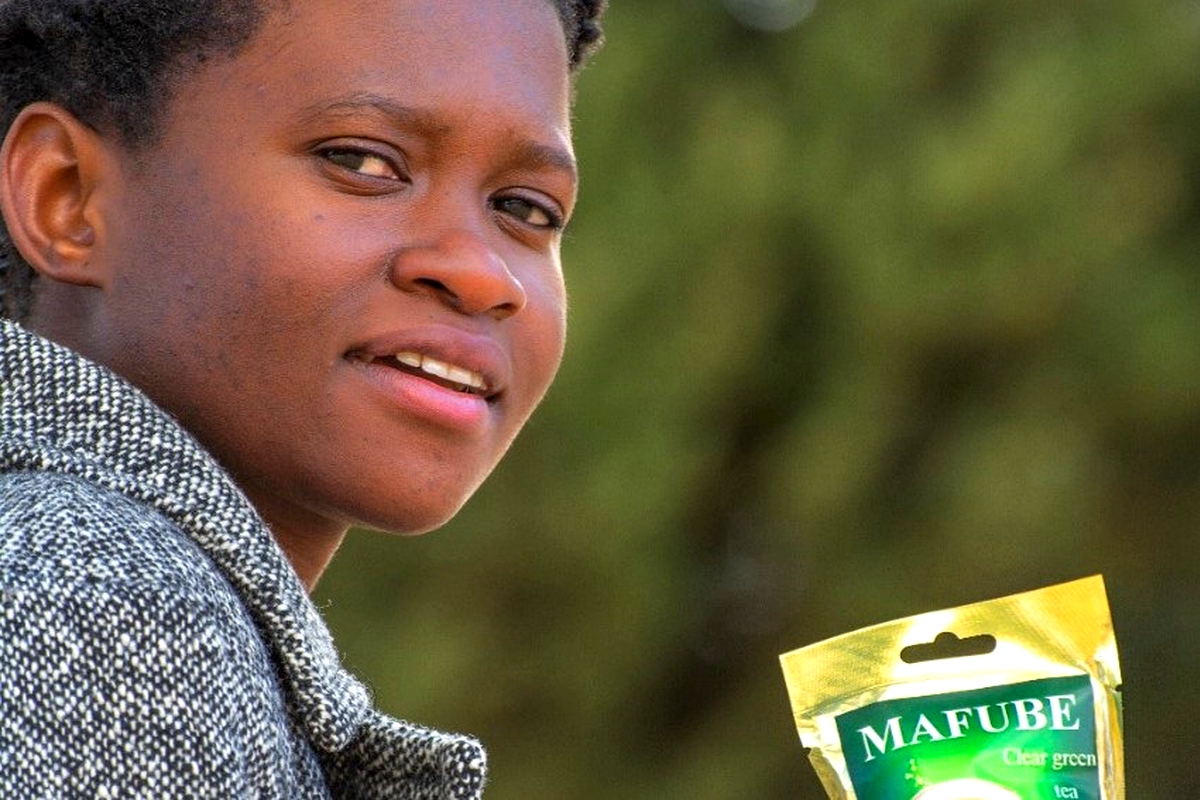FOR more than a year now, the people of Lesotho have enjoyed an appetizing tea in the form of Mafube! “Just when Mafube (sun’s rays) begin to rise, the people of Lesotho get into the habit of making tea,” says the soft-spoken ’Matsomoli Mokhele who is incubating her business at the National University of Lesotho (NUL) Innovation Hub.
business
Aug. 9, 2021
OWN CORRESPONDENT
4 min read
Mafube Wild Olive Tea hits the shelves

’Matsomoli Mokhele with her Mafube Wild Olive Tea
“I wanted to bring an exception to that habit with a tasty healthy local tea,” she adds.
We are approaching two years now since Mafube hit the markets. The reception has been great. “Some people,” ‘Matsomoli says, “just like the unique taste of it all. Others know a thing or two about its amazing health benefits.”
This tea is a mixture of wild mint and wild olive tree leaves found in Lesotho.
You can’t get a better combination.
Today, we trace an interesting journey of a rather shy but hard-working girl from Mafeteng.
“My flirting with entrepreneurship started when I was in high school,” she relates her story. “At that time, I was part of a committee for the school’s science society.”
She says although the school was willing to fund the science society’s frequent participation in science fairs, they, as the society, were also expected to put something on the table. That is why they devised a plan, “each member of the society would sell anything that would bring us revenue.” As a leader who led by example, she too was also thrown into the selling activities.
Those were memorable days because, in her words, “we would actually raise enough money to fund up to 10 participants in the fair.” She doesn’t know if such experiences contributed to her love for entrepreneurship or not, but this is where she is now.
Fate would soon confine her within the fences of the NUL.
Although she wanted to be a nurse and to later get into Dentistry, she found herself doing BSc in Nutrition.
“I grew to love it,” she says, “especially when we started to be introduced to courses dealing with food science and food product development. In fact I later turned down an offer to do Dentistry at the University of Pretoria.”
She still recalls getting into a project where she developed an extremely tasty soup from beans, sunflower and a variety of vegetables and flavours. “In my final year, I would later be involved in a project that was meant to address poor nutrition in babies undergoing weaning.”
That project would create a highly nutritious product best known as Khuisa, which means weaning in English. The product is under development at the NUL Innovation Hub.
“I was invited to the Innovation Hub due to my involvement with that project as a student.”
However, when she entered the hub, a whole new world opened up.
Not only was she told she was free to experiment with anything as long as it wouldn’t kill anyone, but she observed her peers doing just that. She immediately got the spirit, “even as we were pushing Khuisa, we were also pushing other products and Mafube become one of them.”
A trained nutritionist, she says Mafube is more than just a sensory delight.
Enjoy our daily newsletter from today
Access exclusive newsletters, along with previews of new media releases.
Whereas many come to it for taste, taste and nothing else, some consult it for health reasons. These may include chasing away flu and cold. In fact, experts believe that mint may soothe upset stomach, improve digestion, treat bad breath, combat the common cold and flu, reduce fever, improve mental awareness and focus and… the list goes on.
The other half of the mix is wild olive, which scientists tell us its “real” name is Olea europaea L. subsp. Africana. Okay, okay, what matters is that its leaves have been used widely across Africa and other continents for, among others, lowering blood pressure, improving kidney function and dealing with sore throats.
Recently, scientists have demonstrated that the leaves of the tree have a compound called Oleuropein. This mysterious substance has been proven to fight microbes and oxidation in cells which can cause cell damage, making you sick.
It is interesting that ’Matsomoli doesn’t import the raw materials for the tea. “I found it amazing that there are so many people who have grown these trees and herbs and they supply us with raw material year-round, right here in Lesotho.”
She is also impressed by the NUL Innovation Hub’s introduction of the Tholoana Orchard Society. The society seeks to introduce the cultivation of fruits and herbs at a large scale around the country, “we need self-sufficiency in this area as soon as possible,” she says.
The article has been supplied by the NUL Innovation Hub






